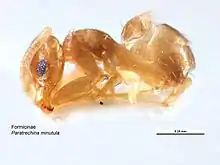Paraparatrechina
Paraparatrechina is a genus of small ants in the subfamily Formicinae.[2] The genus contains 31 species distributed in the tropics of Africa, Asia and Australia.
| Paraparatrechina | |
|---|---|
 | |
| Paraparatrechina minutula | |
| Scientific classification | |
| Domain: | Eukaryota |
| Kingdom: | Animalia |
| Phylum: | Arthropoda |
| Class: | Insecta |
| Order: | Hymenoptera |
| Family: | Formicidae |
| Subfamily: | Formicinae |
| Tribe: | Lasiini |
| Genus: | Paraparatrechina Donisthorpe, 1947 |
| Type species | |
| Paratrechina pallida Donisthorpe, 1947 | |
| Diversity[1] | |
| 31 species | |
Distribution and habitat
The genus is restricted to the Paleotropics. Thirteen species are known from the Afrotropical and Malagasy regions, and twenty-five species and subspecies from Asia and Australia, although preliminary study suggests that there are many undescribed species.[3] Very little is known about the biology of Paraparatrechina in the Afrotropical and Malagasy regions. They have been found in a wide range of tropical habitats from rainforests to forest clearings in sifted leaf litter, rotten logs, under stones, and from beating vegetation and fogging samples from the forest canopy.[3]
Taxonomy
Paraparatrechina was first described as a subgenus of Paratrechina by Donisthorpe (1947).[4] LaPolla et al. (2010a) elevated the formerly synonymized subgenus to genus rank based on both morphological and molecular data.[5]
Description
Paraparatrechina are small (typically around 1–2 mm in total length) formicine ants, which often reflect a metallic iridescence (blue, purple and pink hues have been observed) under light microscopy. In darker species, the iridescence tends to be a darker bluish-purple, while lighter colored species either show little iridescence or reflect a more pinkish-purple hue. Paraparatrechina are usually easily distinguishable from other formicine genera by a unique mesosomal setal pattern: two pairs of erect setae on the pronotum, one pair on the mesonotum and one pair on the propodeum. Nylanderia, the genus most likely confused with Paraparatrechina, never possesses a pair of erect setae on the propodeum. The mandibles of Paraparatrechina also possess five teeth, while in Nylanderia six teeth are usually present.[3]
Species
- Paraparatrechina albipes (Emery, 1899)
- Paraparatrechina brunnella LaPolla, Cheng & Fisher, 2010
- Paraparatrechina bufona (Wheeler, 1922)
- Paraparatrechina butteli (Forel, 1913)
- Paraparatrechina caledonica (Forel, 1902)
- Paraparatrechina concinnata LaPolla, Cheng & Fisher, 2010
- Paraparatrechina dichroa (Karavaiev, 1933)
- Paraparatrechina emarginata (Forel, 1913)
- Paraparatrechina foreli (Emery, 1914)
- Paraparatrechina glabra (Forel, 1891)
- Paraparatrechina gnoma LaPolla, Cheng & Fisher, 2010
- Paraparatrechina iridescens (Donisthorpe, 1942)
- Paraparatrechina kongming (Terayama, 2009)
- Paraparatrechina koningsbergeri (Karavaiev, 1933)
- Paraparatrechina lecamopteridis (Donisthorpe, 1941)
- Paraparatrechina minutula (Forel, 1901)
- Paraparatrechina myops LaPolla, Cheng & Fisher, 2010
- Paraparatrechina nana (Santschi, 1928)
- Paraparatrechina nettae (Forel, 1911)
- Paraparatrechina oceanica (Mann, 1921)
- Paraparatrechina ocellatula LaPolla, Cheng & Fisher, 2010
- Paraparatrechina opaca (Emery, 1887)
- Paraparatrechina oreias LaPolla, Cheng & Fisher, 2010
- Paraparatrechina pallida (Donisthorpe, 1947)
- Paraparatrechina pusillima (Emery, 1922)
- Paraparatrechina sauteri (Forel, 1913)
- Paraparatrechina splendida LaPolla, Cheng & Fisher, 2010
- Paraparatrechina subtilis (Santschi, 1920)
- Paraparatrechina tapinomoides (Forel, 1905)
- Paraparatrechina umbranatis LaPolla, Cheng & Fisher, 2010
- Paraparatrechina weissi (Santschi, 1910)
References
- Bolton, B. (2014). "Paraparatrechina". AntCat. Retrieved 5 July 2014.
- "Genus: Paraparatrechina". antweb.org. AntWeb. Retrieved 23 September 2013.
- LaPolla, John S.; Cheng, Chiu H.; Fisher, Brian L. (2010b). "Taxonomic revision of the ant (Hymenoptera: Formicidae) genus Paraparatrechina in the Afrotropical and Malagasy Regions". Zootaxa. 2387: 1–27. doi:10.11646/zootaxa.2387.1.1.
- Donisthorpe, H. (1947). "Some new ants from New Guinea". Annals and Magazine of Natural History. 14 (11): 183–197. doi:10.1080/00222934708654624.
- LaPolla, J.S.; Brady, S.G.; Shattuck, S.O. (2010a). "Phylogeny and taxonomy of the Prenolepis genus-group of ants (Hymenoptera: Formicidae)". Systematic Entomology. 35: 118–131. doi:10.1111/j.1365-3113.2009.00492.x. S2CID 86659687.
 This article incorporates text from a scholarly publication published under a copyright license that allows anyone to reuse, revise, remix and redistribute the materials in any form for any purpose: LaPolla, John S.; Cheng, Chiu H .; Fisher, Brian L. (2010). "Taxonomic revision of the ant (Hymenoptera: Formicidae) genus Paraparatrechina in the Afrotropical and Malagasy Regions". Zootaxa. 2387: 1–27. doi:10.11646/zootaxa.2387.1.1. Please check the source for the exact licensing terms.
This article incorporates text from a scholarly publication published under a copyright license that allows anyone to reuse, revise, remix and redistribute the materials in any form for any purpose: LaPolla, John S.; Cheng, Chiu H .; Fisher, Brian L. (2010). "Taxonomic revision of the ant (Hymenoptera: Formicidae) genus Paraparatrechina in the Afrotropical and Malagasy Regions". Zootaxa. 2387: 1–27. doi:10.11646/zootaxa.2387.1.1. Please check the source for the exact licensing terms.
External links
 Media related to Paraparatrechina at Wikimedia Commons
Media related to Paraparatrechina at Wikimedia Commons